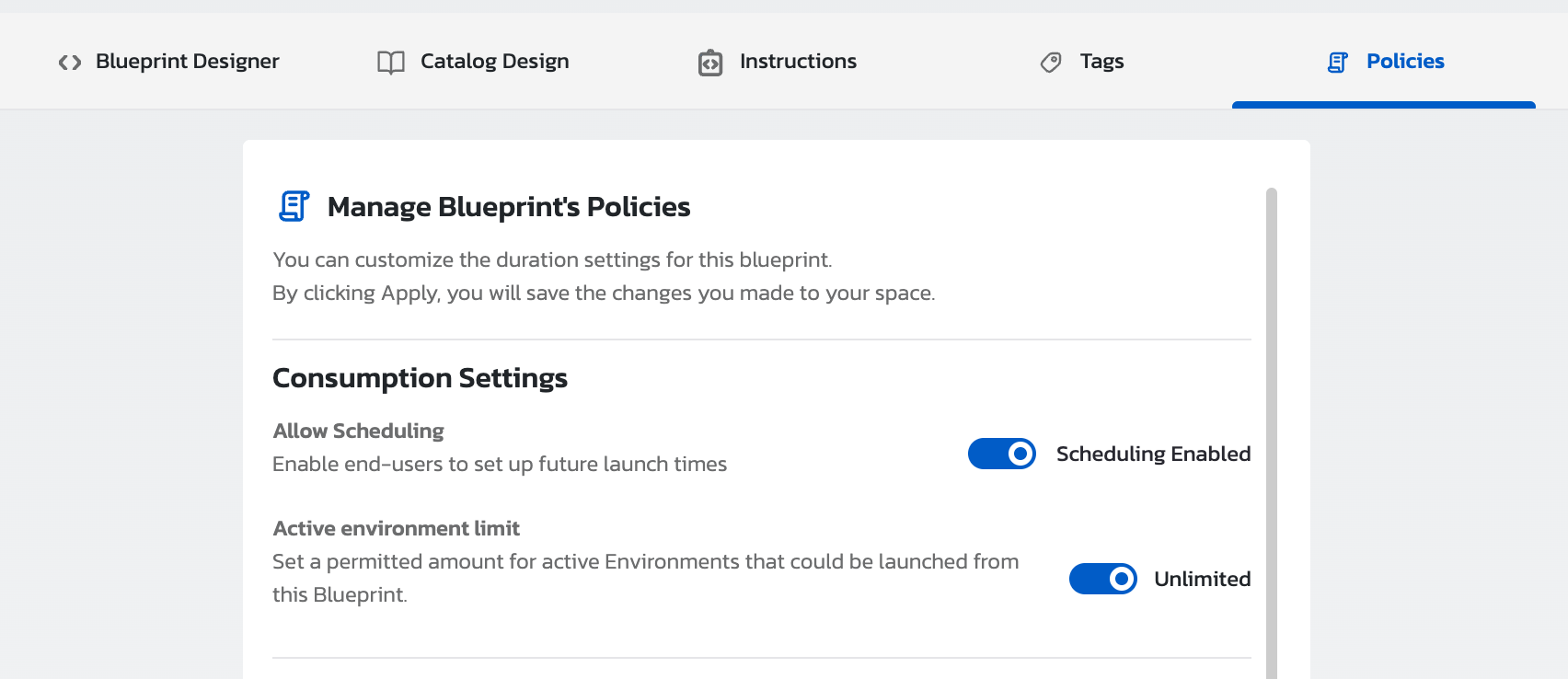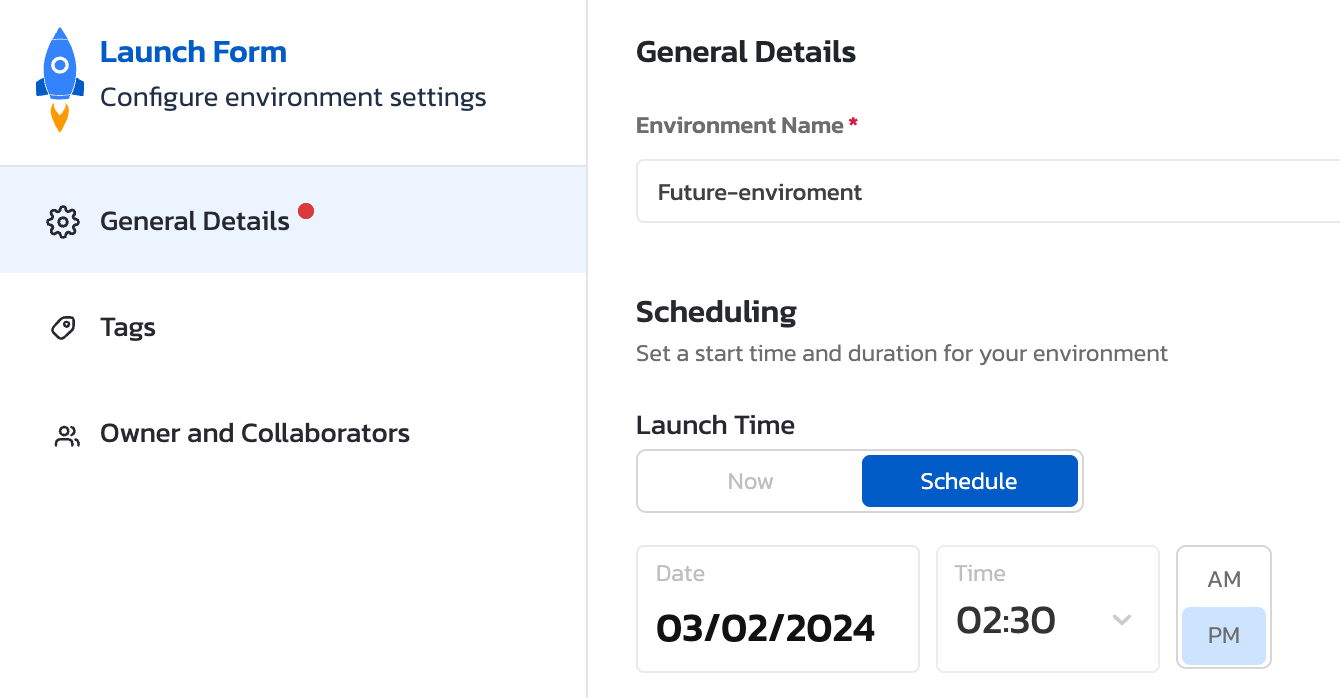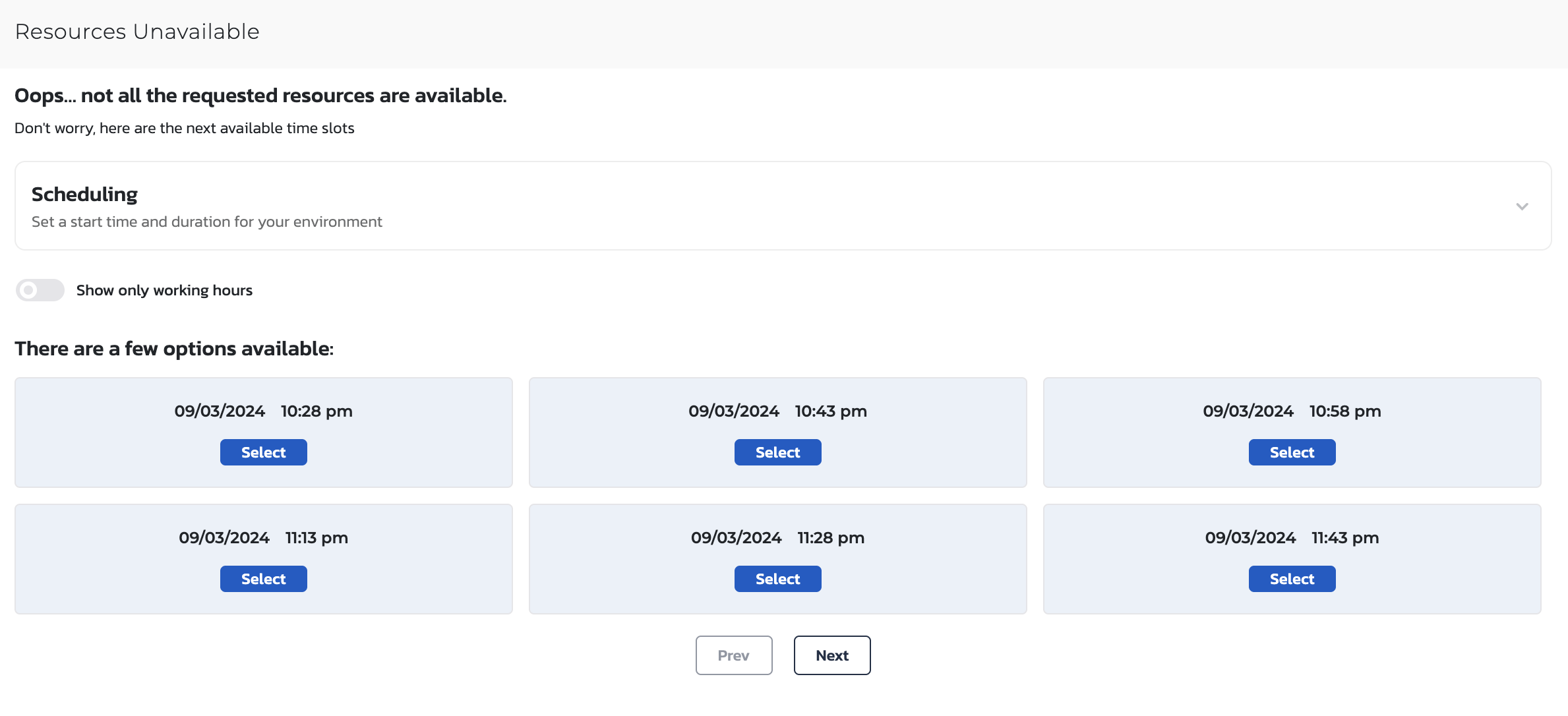Scheduled Environments
Scheduled environments in Torque allow users to plan and automate environment deployments for future time slots. This capability is particularly valuable for organizations that need to coordinate resource usage, plan maintenance windows, or ensure environments are available at specific times for testing, demos, or development activities.
Overview
Environment scheduling enables users to:
- Schedule environment launches for future dates and times
- Reserve resources in advance to ensure availability
- Automate environment lifecycle management around business schedules
- Optimize resource utilization across teams and projects
- Resolve scheduling conflicts with intelligent time slot recommendations
Blueprint Configuration
Allow Scheduling Flag
To enable scheduling for a blueprint, administrators must configure the "Allow Scheduling" flag in the blueprint's consumption policy settings.
Location: Blueprint Policy → Consumption Settings → Allow Scheduling

When this flag is enabled, users will see scheduling options when launching environments from that blueprint. When disabled, environments can only be launched immediately.

Use Cases
Development Team Coordination
Scenario: A development team needs their integration testing environment available for an important sprint planning meeting next Monday at 9 AM.
Solution: Schedule the environment to launch on Monday at 8:30 AM, giving the team a fresh environment ready for their 9 AM meeting.
Benefits:
- Ensures environment is ready before the meeting
- Provides a clean, consistent testing environment
- Allows time for pre-meeting validation and setup
Demo Environments
Scenario: Sales teams need demo environments available during specific time windows for client presentations.
Solution: Schedule demo environments in advance to ensure they're running and configured properly before important client meetings.
Benefits:
- Eliminates last-minute setup issues
- Ensures consistent demo experience
- Allows for pre-validation of demo scenarios
Resource-Intensive Workloads
Scenario: Data science teams need GPU-intensive environments for model training during off-peak hours to optimize costs.
Solution: Schedule environments to launch during low-cost time windows (e.g., nights and weekends) when cloud provider rates are lower.
Implementation:
- Schedule a specific launch for 10 PM when GPU rates drop
- Set automatic termination for 6 AM before peak pricing resumes
- Use custom resource inventory to ensure GPU availability
Compliance and Testing Windows
Scenario: Financial services company needs to run compliance testing in isolated environments during specific maintenance windows.
Solution: Schedule compliant environments during approved maintenance windows, ensuring they don't conflict with production systems.
Requirements:
- Strict time window enforcement
- Automatic termination after testing window
- Resource isolation from production systems
Custom Resource Inventory Integration
Scheduled environments can leverage Torque's custom resource inventory to ensure that required resources are available at the scheduled time. This integration prevents scheduling conflicts and guarantees resource availability.
Resource Reservation Process
- Resource Definition: Define custom resources in the inventory (e.g., GPU instances, specialized hardware, licenses)
- Capacity Planning: Set desired capacity for each resource type in blueprints
- Advance Booking: When scheduling environments, Torque reserves the required resources
- Conflict Prevention: The system prevents overbooking by checking resource availability
Example: GPU Resource Management
# Custom resource inventory configuration
resources:
gpu_instances:
selector:
type: 'GPU'
quantity: '{{ .inputs.gpus }}'
Here are some common "Resource Types" for scheduling:
Hardware Resources:
- GPU instances
- High-memory compute nodes
- Specialized processors (TPUs, FPGAs)
Software Licenses:
- Expensive enterprise software licenses
- Limited concurrent user licenses
- Specialized testing tools
Network Resources:
- Dedicated bandwidth allocations
- VPN connections
- Load balancer capacity
Scheduling Conflict Resolution
Torque provides intelligent conflict resolution when scheduling conflicts occur, offering users alternative time slots that meet their requirements.
Conflict Detection
The system automatically detects conflicts when:
- Requested resources are already reserved
- Maximum concurrent environments limit would be exceeded
- Blueprint capacity constraints would be violated
- Custom resource inventory capacity is insufficient
Next Available Time Slot
When conflicts are detected, Torque offers the "Next Available Time Slot" feature:
- Conflict Notification: User is informed that their requested time slot is unavailable
- Alternative Suggestions: System presents the next available time slots that meet all requirements
- Requirement Matching: Suggested slots consider:
- Resource availability
- Duration requirements
- Blueprint constraints
- Custom resource needs

This comprehensive scheduling system ensures efficient resource utilization while providing the flexibility teams need to coordinate their development and testing activities effectively.